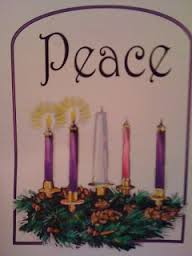
Listen to: Maccabeats: "Candlelight"
enjoy this light-hearted fun!
http://www.youtube.com/watch?v=qSJCSR4MuhU
Part of our Advent journey is cultivating peace. We are encouraged to forge peace is in all our relationships. With the eight-day feast of Hanukkah approaching next week on December 12, it is good for us to remember our ties to Judaism, the faith into which Jesus was born, from which Christianity takes its deepest roots .
It is interesting to note that Hanukkah, also known as the Feast of Dedication" or the "Festival of Lights," is not among the holidays God commanded Israel to celebrate in the Hebrew Scriptures. In fact, we find only find one mention of the holiday in the Bible, in the Gospel of John: "Now it was the Feast of Dedication in Jerusalem, and it was winter. And Jesus walked in the Temple, in Solomon's porch." (John 10:22-23)
Hanukkah celebrates the victory of the Jewish people over King Antiochus Epiphanes from Greece, who tried to ruthlessly impose his religion and culture in 165 BCE. Hanukkah also celebrates the re-dedication of the Jewish Temple in Jerusalem.
Prior to the reign of Antiochus, the Jews lived in relative peace under various rulers and kings. However, when Antiochus came to power, he placed many burdens upon the Jews. They had to pay high taxes. Antiochus tried to force them to replace their Jewish laws and traditions with Greek ones. Newly-appointed priests began to steal from the Temple and send precious gold and silver to Antiochus. The people were furious!
Fearing a revolt, Antiochus ordered his army to storm the Temple. They tore down the city walls and stripped the Temple of anything they could carry. The soldiers placed a Greek idol upon the golden altar and allowed pigs to run within the sacred grounds. Jews were threatened with death if they refused to worship the new idols. The soldiers drank the holy water and set fire to books containing holy writings. Amongst all the chaos, the oil in the lamp was spilled and the light in the Temple went out.
Because Antiochus had his army storm the Temple on the Sabbath, the Jews wouldn't fight back. Thousands were either killed or carried off and sold as slaves. However, a man named Matthias refused to obey the king's men. He took his five sons and others who would follow him into the mountains where they planned how they might regain their right to worship as they pleased. King Antiochus sent an army after them, but they were unsuccessful in defeating Matthias and his men. Under the direction of Matthias and then later his son, Judah, ordinary farmers and shepherds learned to fight like brave soldiers. Finally, after many battles, the king's army was beaten by Judah's men. Jews consider this to be the first miracle of Hanukkah.
The Maccabees, another name for Judah's army, returned to Jerusalem where they found their Temple abandoned and defiled. They immediately set forth to cleanse and rebuild the Temple. When it came time for its rededication, Judah and his men looked for oil to re-light the lamp, but they could only find enough for the lamp to burn for one day. However, the lamp continued to burn for eight days and nights until more oil was made. Jews consider this to be the second miracle of Hanukkah.
Jesus, the Light of the World, would have been familiar with this story, and the miracle of the lights. Hanukkah reminds us that each of us is a living temple (1 Cor. 6:19), with the Holy Spirit in residence in our hearts. This Advent, we need to rededicate ourselves to God — remove those elements foreign to a holy life and run contrary to God's will for us -- so God’s light can shine through our lives in order to touch others.
The miracle of the light reminds us of Jesus, who the prophets predicted would be, "a light to the Gentiles" whose salvation would reach "to the ends of the earth" (Isaiah 49:6).
A traditional Hanukkah hymn declares to God: "Rock of Ages, let our song praise thy saving power; thou admidst the raging foes wast our sheltering tower; furious they assailed us but thine arm availed us; and thy word broke their sword when our own strength failed us." How well these verses speak also to the saving power of Christ we need to recall as Christmas draws closer.
As our Jewish friends celebrate Hanukkah, let it be for us a reminder of why we celebrate Christmas: Jesus came to conquer the kingdoms of this world with all its power and principalities, and to set a light that would never be extinguished.
Let Hanukkah inspire us as we light our Advent candles, and pray for Christ’s light to shine brighter and deeper as we journey to Bethlehem to pay homage to our Prince of Peace.
http://teacherlink.ed.usu.edu/tlresources/units/byrnes-celebrations/hanukkah.html
PRAY: "Lord, You are the light of the world. May your light never go out in our hearts,and may it lead us to your path of Peace."
 RSS Feed
RSS Feed